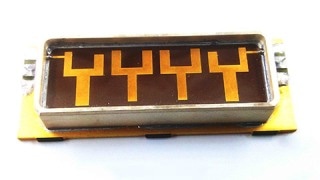Aug 7 2019
Scientists from Siberian Federal University and Kirensky Institute of Physics suggested a novel design for a multimode stripline resonator. The use of such resonators facilitates the creation of tiny band-pass filters with exclusive frequency-selective properties that are in demand by contemporary telecommunication systems. The core results of the study have been reported in the renowned scientific journal Technical Physics Letters.
 Four resonator stripline filter without top screen. (Image credit: Siberian Federal University)
Four resonator stripline filter without top screen. (Image credit: Siberian Federal University)
The swift development and extensive use of telecommunication systems, radio navigation, radar systems, and special radio equipment, together with the presence of natural sources of radio emission, has resulted in a major deterioration in the electromagnetic environment. Each radio device works in its own frequency range, while concurrently forming radio interference for “colleagues.”
To decrease the level of interference, the devices that will perform the frequency filtering of this “noise” are used. Such devices, known as frequency selective devices or filters, are used in radio transmitting devices to diminish the signals produced by them beyond the main frequency band. In the receiving devices, they are used as preselectors, diminishing the level of interference emanating from the antenna.
Thus, radio filters are engineered to highlight electromagnetic waves lying in specific frequency ranges. Frequency bands wherein the attenuation of the signal at the filter output is small are the pass bands (transparency). The remaining frequency ranges are the stop (suppression) bands.
Nowadays, filters are extensively used in electronic technology and have several designs: filters are extensively used on lumped elements—capacitors and inductors; piezoelectric and magnetostrictive filters; filters on surface acoustic waves. However, in the microwave range, marketable ones are the filters based on interacting electrodynamic resonators.
Stripline resonators have an exclusive place among a broad range of electrodynamic resonators. They comprise strip conductors typically situated on dielectric substrates. Stripline resonators are characterized by low cost, miniature size, high reliability, and, most notably—high manufacturability using contemporary planar integrated circuit technology.
In our work, a new design of a miniature stripline resonator on a substrate with a double-sided pattern of strip conductors was proposed. Due to the fact that several oscillation modes are used in the cavity as working, we managed not only to reduce the size of the pass band filters based on such resonators, but also to significantly improve their selective properties.
Aleksey Serzhantov, Professor, Department of Radio Engineering, Siberian Federal University
Serzhantov continued, “The design of the filter developed by the team demonstrates the unique steepness of the slopes of the pass band and the ultra-wide high-frequency stop band, which reaches 100 dB in frequency (attenuation power decay is ten orders of magnitude) up to a frequency five times the center frequency of the pass band.”
He added, “In fact, this means better selectivity than the known world analogues. And this allows us to increase the immunity to interference, increase the quality and range of information transmission, for example, in cellular and satellite communication systems, radar and radio navigation.”
It is acknowledged that the study was carried out with the support of Ministry of Science and Higher Education of the Russian Federation.